Iranian Activist Re-Arrested Hours After Release From Jail
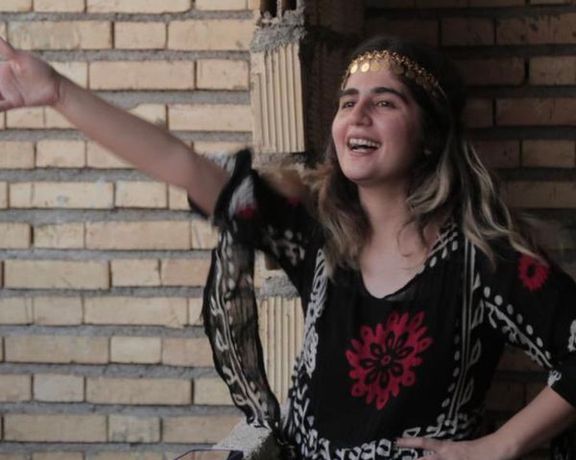
A prominent Iranian civil rights activist has been rearrested just hours after being released from the notorious Evin prison in Tehran.

A prominent Iranian civil rights activist has been rearrested just hours after being released from the notorious Evin prison in Tehran.
A video published on social media shows Sepideh Qolian leaving prison without the mandatory hijab and shouting defiantly: "Khamenei, cruel ruler, we will topple you."
Reports say the fearless activist was arrested by security forces while returning home to Khuzestan. It is said that the citizens who filmed her arrest have also been detained.
Qolian was sentenced to five years in prison for “disrupting public order” and “assembly and collusion against national security” after her arrest in 2018 for her role in publicizing labor protests in Khuzestan. She has also gone on hunger strike several times.
Qolian’s forced confession was aired by the state television in January 2019, a stark warning to others of the consequences of speaking out against the regime.
In the program she was described as an agent provocateur with ties to Marxist groups abroad who had encouraged a strike at the Haft Tappeh Agro-Industrial Complex in Khuzestan.
Gholian later alleged that Ameneh-Sadat Zabihpour, an IRIB journalist involved in filming the confession, had been involved as an interrogator and had tortured her to confess before the camera.
It is all too common for activists to be falsely accused of such charges of espionage and colluding with foreign groups, for which the regime justifies they pay a heavy price in its brutal jails.
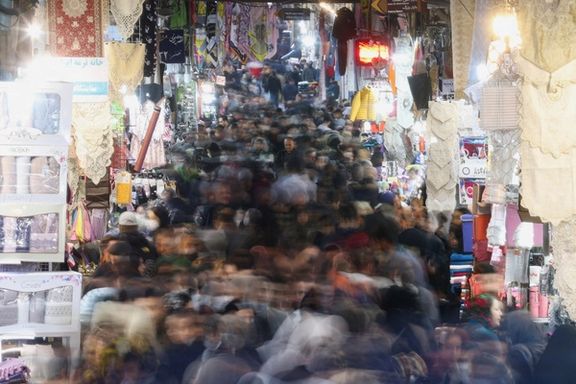
The country’s parliament is planning a raft of new repressive measures in further crackdowns on hijab rebels, including increased surveillance and cutting access to social services.
Bijan Nobaveh, Tehran's representative and a deputy at the cultural committee, admitted that as protests show no signs of abating, more repressive measures are ahead, with the approval of the administration and judiciary.
Increased state-wide surveillance will add further oppression to the country’s suffering population. “Identification of women without hijab in public spaces will be done through surveillance cameras, and punishment will be done according to the prepared tables [guidelines],” he said, though this is widely done already.
Women seen in public without their Islamic headscarf, required under regime law, have been seen multiple times being beaten by brutal security forces.
Further crackdowns to communications are set to come too, after months of internet shutdowns have blighted the country, including millions of women working from home who are now forced back into poverty. New punishments tabled include blocking mobile phones and internet of women who appear in public without hijab.
The announcement this week also reiterated threats against owners and operators of shops, malls and tourist attractions who do not confront women without headscarves. The Islamic Republic has closed down several businesses in the heavily touristic cities of Esfahan (Isfahan) and Kashan as well as in the capital Tehran in recent days, demanding management not allow access for uncovered women.
It is not yet clear how much money the regime, which is already bankrupt, is going to spend on the necessary technologies for such measures.
The new crackdowns come as no surprise. Before the unrest which began in September, triggered by the death in morality police custody of Mahsa Amini, there has long been talk of using cameras to identify women flouting the mandatory hijab rules, part of efforts by President Ebrahim Raisi’s hardliner administration to intensify pressures on women in society throughout the year.
In December, another member of parliament’s cultural committee, Hossein Jalali, said that hijab enforcement will never be abolished, ensuring that “veils will be back on women’s heads within two weeks.” Confirming that the regime is making some changes in enforcing hijab rules, he added that “it is possible that women who do not observe hijab would be informed via SMS, asking them to respect the law. After notifying them, we enter the warning stage... and in the third stage, the bank account of the person who unveiled may be blocked."
Iranian women appearing in public without headscarves has become a common sight across the country. Celebrities keep publishing photos and videos of themselves defying the regime and scuffles with security forces are still seen across social media on a daily basis.
While some politicians have demanded an end to compulsory hijab and laws that legalize discrimination against women, there are many others who have been talking about new methods and punishments to enforce hijab.
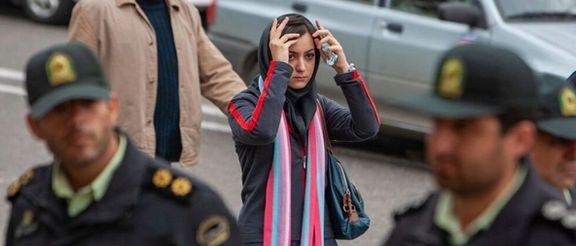
Supreme Leader Ali Khamenei delivered an ambivalent speech about hijab in January, saying hijab is an inevitable duty for all Muslim women, but no Iranian woman should be labeled as non-religious if she fails to fully honor the Islamic dress code.
The Islamic Republic faces a dilemma. Allowing people to wear whatever they desire in public means the utmost failure of the regime's ideology, while enforcing hijab with strict punitive measures can only lead to further resentment in society.
Protests seems to have resulted in police being unable to confront the large number of women unveiling in public with its usual ferocity and the regime’s hardliners are worried that warmer weather in spring and summer would lead to more women defying the country’s strict hijab rules.
Firebrand Cleric Ahmad Alamolhoda -- who is President Ebrahim Raisi's father-in-law -- said earlier in the month that “the regime is no longer powerful enough to stand against women who defy compulsory hijab,”. Imam Mohammad-Nabi Mousavifard also said in February that the authorities should approve new laws to deal with women who do not observe hijab “otherwise women will come to the street naked this summer”.
On Tuesday evening, hours after the parliament session on enforcing the hijab, thousands of young Iranians took to the streets in several cities, dancing with their hair flowing freely and burning headscarves and photos of Khamenei. They came out to mark the ancient Iranian annual fire festival and used the occasion to vent their anger at security forces.
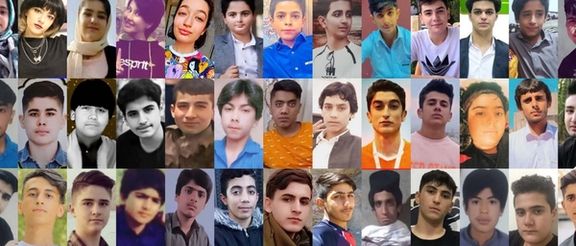
Iran’s regime has committed acts of torture, rape and other sexual violence against child protesters as young as 12, Amnesty International says in its latest report.
The international human rights organization has conducted research into the repressive measures Iranian intelligence and security forces have used against children in the six months since protests erupted in Iran.
“The research exposes the torture methods that the Revolutionary Guards, the paramilitary Basij, the Public Security Police and other security and intelligence forces used against boys and girls in custody to punish and humiliate them” and to extract forced “confessions,” Amnesty said.
At the height of the protests in from October to December last year, almost daily reports and videos from Iran revealed many cases of children being arrested, tortured, and dozens who were killed or blinded by gunfire. But the report released Thursday is based on a systematic collection of evidence and testimonies from victims and families, implicating the Iranian government in violence against children.
“Iranian state agents have torn children away from their families and subjected them to unfathomable cruelties. It is abhorrent that officials have wielded such power in a criminal manner over vulnerable and frightened children, inflicting severe pain and anguish upon them and their families…This violence against children exposes a deliberate strategy to crush the vibrant spirit of the country’s youth and stop them from demanding freedom and human rights,” said Diana Eltahawy, Amnesty International’s Deputy Regional Director for the Middle East and North Africa.
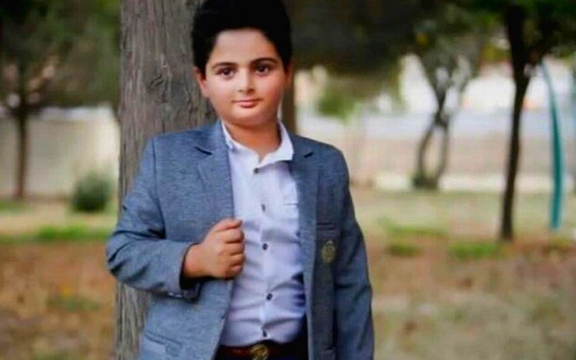
The report also said that although the government has not released a breakdown of the 22,000 protesters it says it arrested, a significant portion of demonstrators were children. Many have been held alongside adults, Amnesty said, which is a violation of international standards. They were “subjected to the same patterns of torture and other ill-treatment.”
Amnesty International also said that its investigation revealed “that state agents used rape and other sexual violence, including electric shocks to genitals, touching genitals, and rape threats as a weapon against child detainees to break their spirits, humiliate and punish them, and/or extract ‘confessions.’ This pattern is also widely reported by adult women and men detainees.”
Cruel treatment of children also included detention in inhumane conditions, including extreme overcrowding, poor access to toilets, insufficient food and water, exposure to extreme cold and solitary confinement, Amnesty said.
The United Nations launched an investigative and fact-finding mission in November tasked with looking into all the reports and evidence of severe rights violation by the Islamic Republic. The members of the team were appointed in December.
The UN Human Rights Council announced that President Federico Villegas has appointed Sara Hossain of Bangladesh as the chair of the mission. Shaheen Sardar Ali of Pakistan and Viviana Krsticevic of Argentina are the two other members of the mission.
“The authorities must immediately release all children detained solely for peacefully protesting. With no prospect of effective impartial investigations into the torture of children domestically, we call on all states to exercise universal jurisdiction over Iranian officials, including those with command or superior responsibility, reasonably suspected of criminal responsibility for crimes under international law, including the torture of child protesters,” Amnesty demanded.

Iranian Nobel Peace Prize laureate Shirin Ebadi asked the European Parliament to support the women-led uprising in Iran during a special session on Wednesday.
Ebadi -- who was awarded the 2003 Nobel Peace Prize for her pioneering human rights efforts, especially for women, children, and refugees -- addressed MEPs, urging the EU to maintain pressure on the Iranian regime over human rights violations.
She called on MEPs not to turn their back on the protests in Iran, sparked by the death of 22-year-old Mahsa Amini, during which more than 550 people have been killed and more than 20,000 arrested so far. "Do not give in to this regime," she appealed to the parliament, insisting that "sanctions work" against the Islamic Republic’s authorities.
"Subordinate aid to Iran, contracts with Iran, and treaties with Iran to respect for international norms, otherwise the money will not benefit the Iranian people at all," said the activist, who now lives in exile.
Before the Iranian opposition figure took the floor European Parliament President Roberta Metsola, European Commission President Ursula von der Leyen, and astronaut Samantha Cristoforetti delivered speeches about empowering women, reiterating that the International Women's Day – which was celebrated globally on March 8, must be seen as an invitation for societies to do better.

“International Women’s Day is marked in our annual calendar not only to recognize the achievements of women and girls across the world but also as a call to action,” Metsola said. “A rallying point to strengthen gender equality across all spheres of our society.”
Paying homage to Ebadi, she said, “Your presence is a reminder that the fight will not cease, and that freedom requires courage and sacrifice... Women will not go silently into the night. They will not give up. And the European Parliament will continue to stand with the women of Iran.”
“Today I want to honor all those women who are fighting for their freedom and inclusion; women who are killed, beaten, and abused all over the world just for being women…All those women who face all this and remain unbowed and unbroken,” she added.
Commission President Ursula von der Leyen also praised all the courageous Iranian women fighting for their “freedom to show their hair or cover it, to study, work, to love without asking for anyone’s permission” and for inspiring women across the world.
Ebadi emphasized that Iranian protesters’ demand is regime change under the slogan “Woman, life, freedom,” and called on democracies not to remain indifferent to human rights violations in the country.
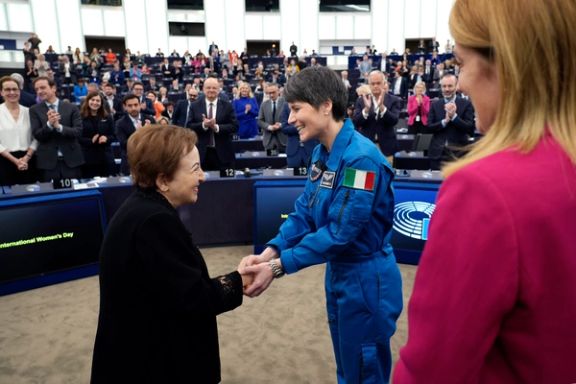
Describing the dire situation of imprisoned journalists, lawyers, artists, activists and young schoolgirls, she decried the absence of a functioning and independent justice system in Iran. "Don't look away from the immense violations of fundamental rights in Iran," she called on the MEPs.
Ebadi also urged the world to designate the Islamic Revolutionary Guard Corps – the IRGC – as a terrorist group. The 27-nation European bloc has so far stopped short of formally labelling the IRGC a terror group, despite calls to do so from Germany and the Netherlands as well as several rounds of rallies by Iranian diaspora communities to push for blacklisting the outfit. She categorically said, “the Revolutionary Guards is a terrorist group," and urged the UE to "say it officially."
Reassuring that Europe would benefit from a democratic Iran, she said if democracy is established in Iran, not only will the number of refugees fleeing from the region be reduced but also peace and calm will be brought back to the region. "Democracy is the key to Iran's future, it is the key to peace and stability in the whole region, and it is also in your interest," she argued. "If democracy comes to Iran, there will be fewer refugees in your country."
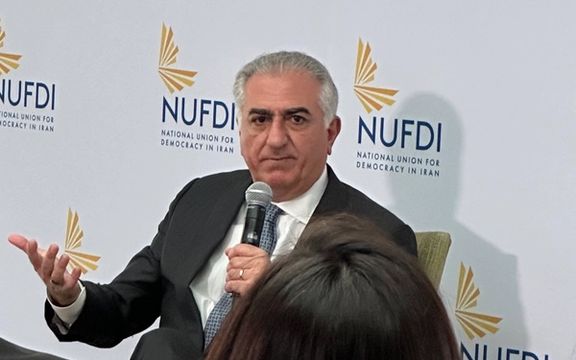
Iran’s exiled Prince Reza Pahlavi addressed lobbyists in the US this week calling for bipartisan support in the US and Europe to achieve a secular Iran.
Speaking at an event held by the National Union for Democracy in Iran (NUFDI) trying to engage “maximum support” for the anti-regime protests in Iran, he criticized current US foreign policy.
All measures, he said, including sanctions, taken to contain the Islamic regime in Iran “is based on a false premise and expectation which was behavior change.”
“Expecting them to change their behavior is such a waste of time,” he added.
Pahlavi reiterated that talks and deals with the Islamic Republic are fruitless because “this regime has proven that its DNA, its reason to exist has nothing to do with the national interests of the country and its people; they’re there only to export their ideology at the expense of the Iranian people.” “For them to succeed, the rest of the world has to fail,” he said, explaining the mentality of the regime.
“It’s zero-sum; they [Iran] cannot have an actual coexistence with a world that is democratic and where human rights are the basis of laws and rules,” he said. He echoed the NUFDI’s call for the annulment of any talks to revive the 2015 nuclear deal with the regime, saying that the world assumes that the deal – known as the JCPOA – would work as a safety catch but a cheating regime can uncheck the safety mechanism if it wants to pull the trigger.
The NUFDI unveiled a 15-point document consisting of action plans and strategic tools for the provision of maximum support as a complement to the US policy of “maximum pressure”, which holds the promise of creating a more complete framework for US-Iran policy.
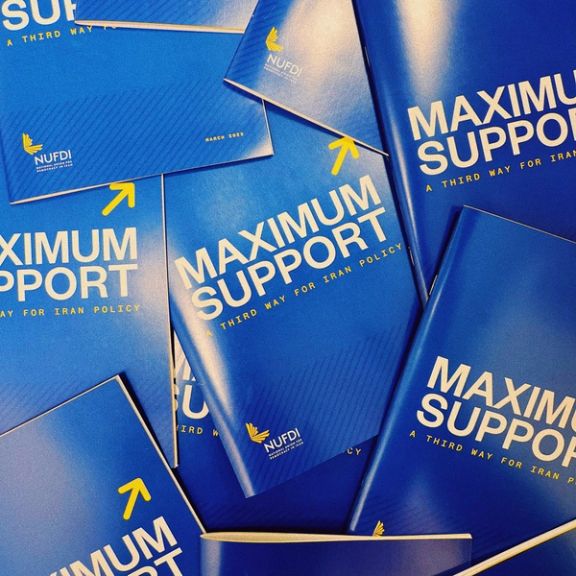
It calls for a mechanism to hold the Islamic Republic accountable through economic and diplomatic isolation, which also engages, elevates and empowers the Iranian people through the provision of much-needed moral, logistical and financial support. The two strategies work hand-in hand as the pressure on the Islamic Republic weakens the regime in the face of a growing democratic movement and strengthens the Iranian people relative to their oppressors.
In the opening speech of the event, NUFDI Policy Director Cameron Khansarinia said, “We believe that maximum pressure on the Islamic Republic is necessary; holding the regime accountable for crimes against the Iranian people is not only a movement for freedom, it’s absolutely necessary. Pressure on the Islamic Republic is a form of support of the Iranian people because it comparably weakens the regime and maximum support for the Iranian people is a form of pressure on the regime because it empowers, emboldens, and strengthens the people vis-a-vis the Islamic Republic.”
“First the US must announce a strategic policy shift in its Iran policy,” he said, adding that “the president should publicly address the American people in support of the Iranian people’s movement for a secular democracy.” “Maximum support begins with a formal strategic realignment of US policy and the president coming out formally in support of the Iranian people's right to determine their future and right to a secular democracy” he noted.
Several pundits from different think tanks, such as the Middle East Institute, American Progress and Carnegie Endowment for International Peace, as well as Member of Canada’s House of Commons Ali Ehsassi and Member of the Belgian Parliament Darya Safai were among the other participants of the event.
A popular voice for the revolutionary movement, Pahlavi said that it is futile to negotiate with the regime because only eradicating the regime can lead to true change. “Secular opposition has the answers,” he said, calling such an action “a controlled implosion” of the regime and not the “anarchy,” which many believe is making the Western powers hesitant to put more weight behind the protesters.
Pahlavi said that “the regime change is not a bad concept” only because it was mishandled somewhere else such as Iraq, emphasizing that it is futile to negotiate with the regime about the solutions for the country “because they’re part of the problem, and the secular opposition has the answers.”
Pahlavi noted that one of the most important mechanisms for the transition to a democratic Iran is using Tehran’s frozen funds in foreign countries to support strikes by workers in the oil, gas and transportation sectors.
He said one of the most significant elements that put pressure on the previous regime leading to the 1979 revolution, through which his father was overthrown, was financial support for the striking workers of the oil industry.
He underlined that the amount of money needed to support the striking workers is way lower than the funds blocked in other countries due to the US sanctions, saying that supporting workers, who would normally earn around $300 per month, for a few months would offer a manageable solution.
He called for bipartisan support in the US – and in other European countries for that matter, saying that politicians from across the spectrum should support a secular Iran and engage in dialogue with the united front of democratic opposition. "We should take a book out of the experiences that the Israelis have had,” he said, adding that “when it comes to Israel, we expect bipartisan support” from the US regardless of party affiliation. “We don’t expect anything short of bipartisan support when it comes to Iran and our freedom and human rights.”
He described supporting the protesters in Iran as a win-win situation for the world, especially the European countries. He said the immediate tangible benefits would be supplying the energy needs of Europe through Iran’s gas reserves and the stop of the flow of immigrants fleeing from the conflicts in the region to Europe, which is saturated by the number of migrants.
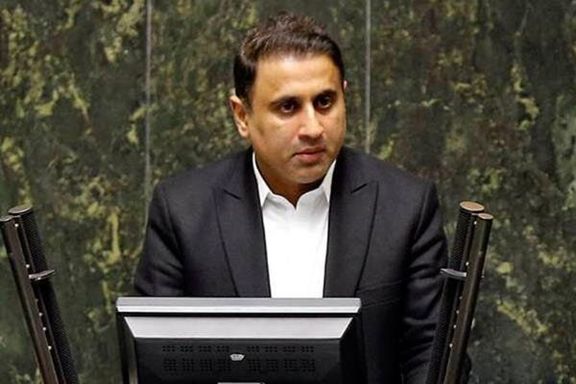
An Iranian lawmaker has called for justice for the victims of Bloody Friday, a deadly massacre killing 93 civilians in September.
The deadly day, in Zahedan, the provincial capital of Sistan and Baluchestan and home to a large Kurdish population, took place when security forces brutally suppressed demonstrators gathered in front of a police station to protest the killing of Mahsa Amini and the rape of a 15-year-old Baloch girl by the police chief of Chabahar.
Security forces controlled by the Revolutionary Guard, under the Commandership of the Supreme Leader, killing dozens, including 18 children, 300 more seriously injured.
Mowlavi Abdolhamid, the religious leader of Iran’s largely Sunni Baluch population called the massacre "Bloody Friday" and held Supreme Leader Ali Khamenei directly responsible for the massacre.
Moineddin Saeedi, representative of Chabahar city, on Tuesday warned President Ebrahim Raisi that the issue should be handled “with special attention”.
Abdolhamid said in his recent Friday prayer sermons that he is still following up on the rights of the victims of Bloody Friday emphasizing that the measures taken so far are “inadequate”.
The government has failed to conduct a transparent investigation or hold any security officials responsible for the deaths.
“Eighty people are still in hospitals and 17 were shot in the eyes and blinded," added Abdolhamid.
Since Bloody Friday, the people of Zahedan have held their weekly protests pouring into streets for twenty-three consecutive weeks. The protesters have vowed to continue their street demonstrations until the punishment of all the leaders and perpetrators of the massacre.